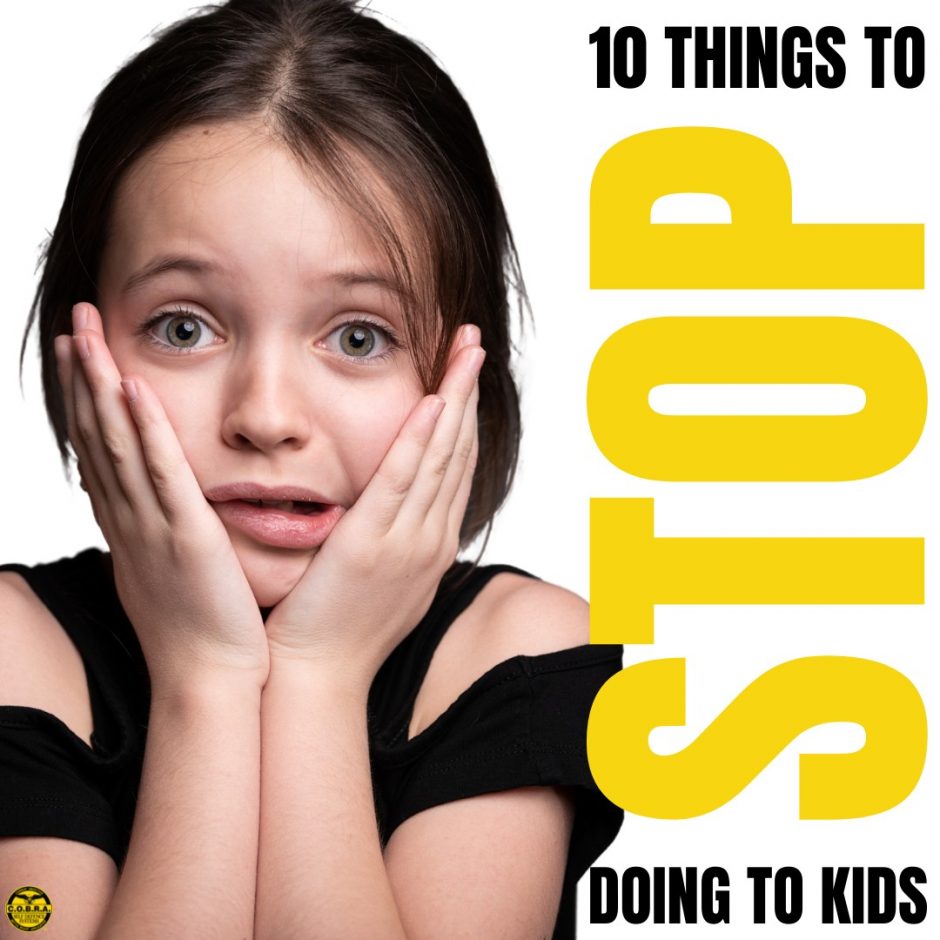
Most parents strive to be the best parents they can be. But some of their actions may be doing more harm than good. With the new year upon us, now is the time to make some adjustments and kick some bad habits to the curb. Here are ten things you need to stop doing today to help make your children better, stronger and safer in 2022 and beyond ![]()
1. DOING EVERYTHING FOR THEM
In an effort to make your kids’ lives easier, you may be doing them a disservice. The best way to raise strong, capable and independent children is to allow them to practice being strong, capable and independent.
So what if milk gets spilled onto the counter instead of making it into the glass because you didn’t step in to help? Kids can learn a lot by trying things on their own. Plus, allowing them to try to master new skills shows them that you believe in them, and that helps build confidence. Life skills and confidence are valuable lessons kids will use throughout their lifetime, and essential to keep them safe in a far-from-perfect world. Most kids don’t learn how to handle real-world situations until they’re in high school. Don’t wait until your kids are teens to teach them life skills.
Get a jump start on teaching your children practical lessons. Start with decision making and then build on a broad range of life skills as your children grow, including self defense and the ability to handle emergency situations.
2. OVERUSING TECHNOLOGY
There’s no denying that technology has become an integral part of our lives. Whether it is at work, for school, or simply keeping up with family and friends, everyone relies on technology to get things done. Tablets and video games are also great babysitters. But it’s important to have some time apart from technology to simply be with your family members. As tempting as it is, don’t overuse technology or depend on electronics to entertain your kids. Set time limits, stick to them, and plan other activities, like board games and crafts, that still give you a break without leaning on electronics as a crutch.
To help make it easier to unplug, consider creating gadget-free times and zones in your house. It may take a concerted effort, but in the end it will be beneficial for everyone if you all have some technology-free time together. It will also limit the risk of your child falling into the dark world of online predators and misuse of personal information.
3. IGNORING BAD BEHAVIOR
When kids throw tantrums, speak disrespectfully, are disruptive, or fight with their siblings, it’s tempting for parents to overlook the problem behaviors and rationalize that it’s just a phase their kids are going through. They may even tell their kids to work out those sibling spats on their own. While kids do need to learn to problem-solve—and sometimes they are just going through a phase—it’s also important to communicate that certain behaviors are not appropriate. Try to use these situations as teaching moments.
Addressing problem behaviors quickly and efficiently can help curb them before they get out of hand. Plus, there are some bad behaviors that simply must be tackled before they become a major issue, such as threatening others, aggression and hitting . Ignoring certain behaviors can be a discipline strategy, but it should not be used in every situation. Kids need regular direction and guidance in order to learn to behave appropriately. This will not only help them avoid antisocial and negative behaviors themselves in the future, but to also recognize (and avoid or stop it) in others.
4. GLOSSING OVER IMPORTANT CHATS
As your kids grow, the topics of your talks may change, but their importance doesn’t. Yet it’s not uncommon to neglect addressing those important subjects that are either on the horizon or affecting them at the moment. Hectic schedules may get in the way. Or you may feel nervous about broaching a serious topic and put it off.
Instead of waiting until there is a problem, take a more proactive approach and talk to your kids about important issues early and often. This will help you both feel more comfortable. Talks about sex, consent, and safe dating can really make a difference for your kids.
Avoiding the difficult subjects in your child’s life is not going to make them go away or keep them from happening. What’s more, the lack of communication can actually be a disservice to them. There is no doubt issues such as sexual assault and bullying plague kids lives on a daily basis and you should be talking about them.
Having a direct, genuine conversation with your kids about tough issues is not only healthy, but it could also be life-saving. Yet, many parents refrain from talking to their kids about the tough issues because they are afraid talking will put the idea in their head. But research has shown that silence and stigma prevent those at risk from reaching out for support.
5. FAILING TO TEACH STREET SMARTS
Being street smart goes beyond looking both ways before you cross the street. Talk to your kids about how to stay safe when they are riding their bike, visiting the shops, and hanging out with friends.
Make sure they know how to be aware of their surroundings and what to do if a stranger approaches them. Require that they go places with a friend and keep you informed of their whereabouts. Stress that they trust their instincts. If something feels wrong or unsafe, it probably is. They are probably not overreacting and even if they are, who cares? It is better to be cautious than to take risks.
6. ALLOWING THE WRONG FRIENDS
Every parent wants their kids to socialize with their peers and make new friends. But if a friend isn’t exactly the influence you want, it may be time to intervene. Make sure your kids know what constitutes a healthy friendship and how to identify fake friends or toxic friendships. Learning to identify unhealthy relationships could save your child a lot of heartache later.
Depending on the severity of the situation, there are plenty of ways to handle things when you’re concerned about your kids’ friends. Obviously, the best option is to talk to your kids about your concerns. You also could establish limits and help your children learn how to set boundaries for themselves.
Also be careful about forcing friendships on them. A common flip side of not liking your children’s friends occurs when you end up forcing another child on your own kid. You schedule play dates, enroll them in the same activities, and pester your child to text them because you’re just so giddy about this friendship. However, if your child is less enthusiastic about the friendship than you are, you need to lighten up.
While it’s fine to help them establish friendships, forcing your child into a relationship with a person that they don’t connect with will ultimately lead to failure. Let your child take the lead on who they befriend and spend time with. As long as the person they choose is not a bully or engaging in peer pressure, it’s probably a suitable friendship.
7. SAYING YES TO EVERYONE ELSE
You are one person. You can’t sew the costumes for the class play, coach three days a week for each one of your children’s sports teams, and bake 300 cupcakes for the school bake sale in two days.
It is important that you role model behaviors for your children, and this includes being assertive when needed and saying no to others if warranted. Help out on your terms and don’t succumb to guilt. Volunteer at your child’s school once a month instead of every week. Be the team parent once a year instead of every season for all of your kids. You simply can’t say yes to everything and it’s important that you teach your children it is okay to say no, especially if it is in their own best interest. Ditch the super mum cape and be true to who you are.
8. NOT RAISING THEM TO BE TOUGH
Mentally strong kids are prepared for the challenges of the world. To be clear, mental strength isn’t about acting tough or suppressing emotions. It’s also not about being unkind or acting defiant. Instead, mentally strong kids are resilient and they have the courage and confidence to navigate the real world safely and reach their full potential.
Kids who are mentally strong are able to tackle problems, bounce back from failure, and cope with hardships. There are many parenting strategies, discipline techniques, and teaching tools that help kids build mental muscle. Tailor your approach to meet the specific needs of your child. But whatever tactic you use, be sure to show your child how to face fears.
If your child avoids anything scary, they’ll never gain the confidence they need to handle feeling uncomfortable. Whether your child is afraid of the dark, or they are terrified to meet new people, help your child face their fears one small step at a time. Cheer them on, praise their efforts, and reward them for being brave and they’ll learn that they’re a capable kid who can handle stepping outside their comfort zone, and handle any difficult situations they may face.
9. NOT TAKING YOUR CHILD OUT OF THEIR COMFORT ZONE
Parents should encourage their children to try and continue activities that might be challenging. Encouraging kids to try new things gives them a chance to prove that they can do anything.
Many people may believe that if they are either good or not good at a skill, it is because they were born that way. The problem with this belief is that it leads many kids to give up on things easily if they do not succeed right away. We suggest that you give your child the opportunity to pursue at least one difficult thing; an activity that requires discipline to practice. The actual activity does not matter so much as the effort and the learning experience that comes with it.
Also exposing them to uncomfortable situations, such as simulated child abductions in our COBRA courses, or difficult consent scenarios and attempted assaults, helps kids practice for the inevitable time when they will be out of their comfort zone and subject to uncomfortable emotions, and decision-making situations. This can be life-saving practice for real-world situations.
10. FAILING TO TEACH ASSERTIVENESS
Most children are not naturally assertive. They need to be taught that they can stand up for themselves. It’s also important to teach them the difference between being assertive and being aggressive. Explain that aggressive kids try to force other people to think like them or do things their way. Meanwhile, assertive kids are respectful of other people’s differences and ideas but aren’t afraid to assert their own beliefs and ideas. Remember, assertive kids, feel comfortable defending themselves when someone says or does something hurtful.
Here’s to a happy,. healthy and safe year ahead for all!
If you found these tips useful, share and follow me on Facebook and Instagram. Because in 2022 and every year, one child is too many

